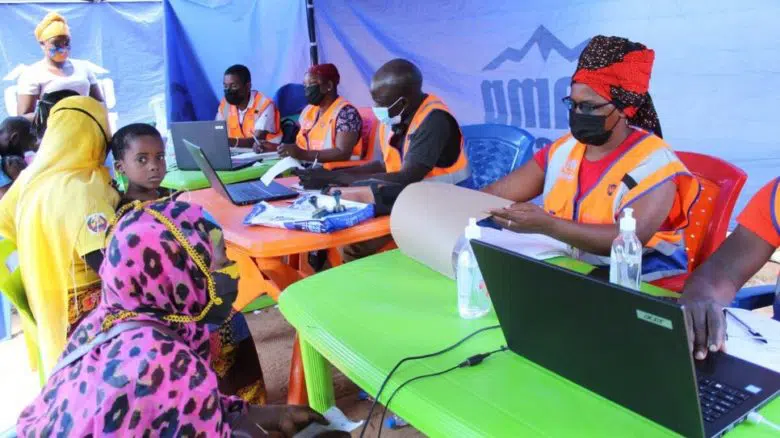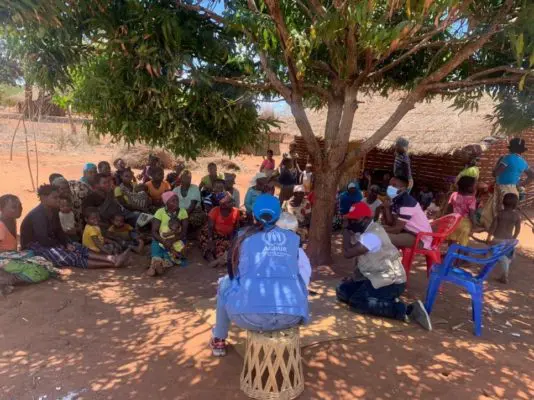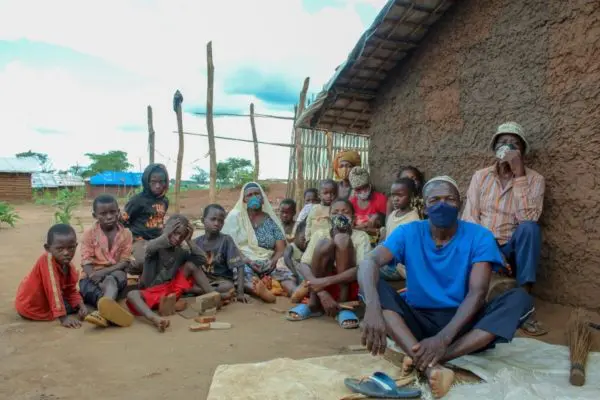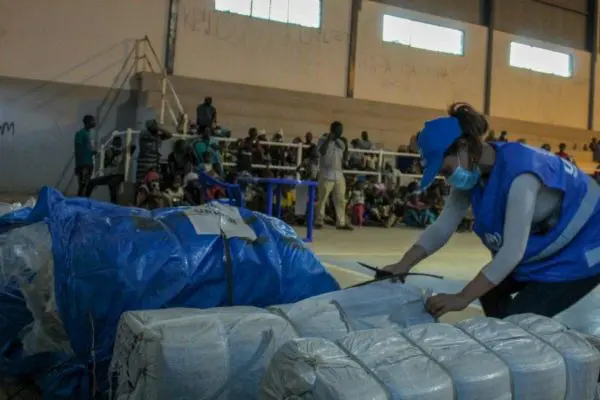
Legal counselors collect information from forcibly displaced people to issue them with new identification cards in Cabo Delgado, Mozambique.
© UNHCR/Juliana Ghazi
UNHCR is helping thousands of displaced Mozambicans get identification documents, making it easier for them to access formal jobs and vital services.
By Juliana Ghazi in Pemba, Cabo Delgado, Mozambique
After almost a year of being separated from her family and scraping a living in Pemba, the capital of Mozambique’s Cabo Delgado province, Nana Ali can finally see an end to her struggles. She has received new identity documents that will make it easier for her to find work and earn some much-needed income.
The 22-year-old mother of two fled Mocimboa da Praia in embattled Cabo Delgado in March last year, after non-state armed groups invaded the town. When gunfire erupted around midnight, she fled with her family, finding temporary safety at a neighbour’s house.
“We couldn’t afford transport for the whole family so only one of us could leave,” Nana explains.
The journey from her coastal hometown to Montepuez, 200 miles inland, costs 500 meticais (about US$8). Nana and her husband agreed that she would go ahead, and the rest of the family would follow later.
After a few weeks in Montepuez, Nana ran out of money, but she managed to hitch a ride in a truck heading to the busy port city of Pemba where she hoped to find work and save some money to send to her family.
She soon realized that this would not be easy as her documentation had long expired, putting her in a difficult position. To be employed legally in Mozambique, valid national identity documents are a requirement.
“The beauty of this project is that [its] encouraging a safer environment for all.”
Unable to work and support her family, Nana was forced to scavenge for food in the city.
Like Nana, Nambit, 21, also fled her village in Mocimboa da Praia in July last year, arriving first in Palma where she stayed for nine months, before fleeing again after the town was attacked last March.
“I don’t know where my husband is. We were separated in the chaos,” she says.
She finally arrived in Pemba, where she has been living with her five-year-old daughter who lacks a birth certificate.
The two women’s situation is common among internally displaced people (IDPs), many of whom lack proper civil documentation, either lost while escaping or expired, or never had one in the first place. They face many obstacles as they cannot move freely, have limited access to life-saving assistance and services such as healthcare and jobs. They are also at risk of harassment or arbitrary arrest and detention.
Since the conflict started in October 2017, about 745,000 people have been displaced, with the most recent bout of fighting in March and April driving 100,000 people, many already IDPs, to flee from Mocimboa da Praia and Palma.
Lacking documentation exacerbates living conditions for vulnerable IDPs. But thanks to a joint legal project by UNHCR, the UN Refugee Agency and the Catholic University of Mozambique (UCM), IDPs who lack identification documents are being assisted to acquire new ones.
Margarida Loureiro, UNHCR’s Head of Office in Pemba emphasized the importance of civil documentation in such conflict situations.
“The beauty of this project is that both displaced and host communities are being assisted with civil documentation, encouraging a safer environment for all,” she said.
Samuel Chakwera, UNHCR’s Representative in Mozambique added that alongside the last years of fighting, Cabo Delgado’s residents have long faced chronic underdevelopment, as well as cyclones and other challenges.
“The documentation allows the displaced and local residents to play an active role in rebuilding their lives,” he added.
Currently underway in Mahate, a neighbourhood in Pemba, the project offers legal counselling to IDPs and their hosts and facilitates access to birth registration and legal documentation. It will also expand to the neighbouring districts of Metuge and Montepuez.
“I can bring my family here so we can be together again.”
Additionally, the programme gives law students the chance to put their legal skills into practice. Maria Abilio and Jesuino Sumaila, both in their fourth year of law school at UCM, joined the project as legal advisors.
“It feels good to help others. It’s like helping my family,” said Jesuino, 22, adding that most of the beneficiaries are from Mocimboa da Praia, which is not far from his hometown, Mueda.
Maria adds that the work is one way to help alleviate IDPs’ suffering as it gives them some hope.
“It’s quite overwhelming to hear about the abuses and violations these people have faced. We have a common responsibility to help them with opportunities for a fresh start,” she added.
Subscribe to UNHCR’s mailing list
The legal clinics are open three times a week, assisting an average of 80 to 100 people daily. Since last December, almost 13,000 IDPs, mostly women and children, have been helped.
Nambit has started the process of getting a new ID and a birth certificate for her daughter. With these new documents, she can look for a job and provide for her little family.
Meanwhile, Nana is anxious to reunite with her family after receiving her new documents.
“I can now look for a job and educate my children,” she says. “More importantly, I can bring my family here so we can be together again.”
Originally published by UNHCR on 22 October 2021.





